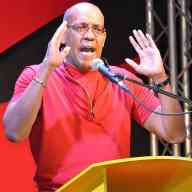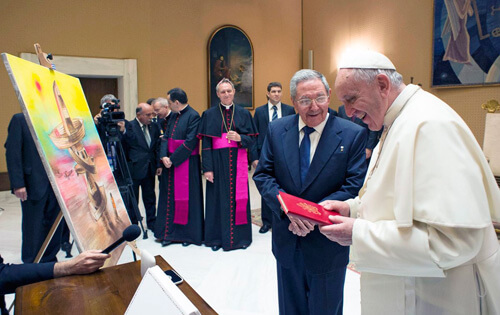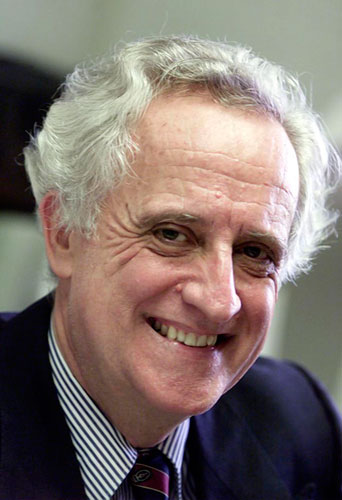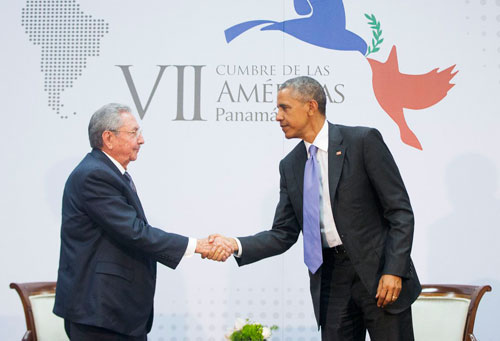“WAR” in Guyana; “Debt” in Jamaica; and “Revolution” in Grenada & TT.
Revolts in the French and Spanish Caribbean often define protests in the region. Often referenced as the “largest and most successful slave rebellion in the Western Hemisphere,” the Haitian rebellion from 1791 to 1803 ended France’s domination over the Caribbean nation and in the process stopped slavery there.
Although Spain relented to Cuba’s demand for independence during the end of the 19th century — (formally in 1902) attorney Fidel Castro, his brother Raul and a determined group of freedom fighters successfully established the first communist state in the Western Hemisphere by “leading an overthrow of the military dictatorship” that now celebrate the Jan. 1, 1959 Cuban revolution.
Lesser discussed are uprisings throughout the English-speaking Caribbean.
During a two-day focus on former British colonies, “Wake The Town & Tell The People” spotlighted five films that feature footage retracing explosive events that occurred during the 1970s and more ironically after colonial rule.
“W.A.R. Stories” directed by Clairmont Chung delved into events preceding the 1980 bomb-blast murder of 38-year-old, Guyanese intellectual and leader Walter Anthony Rodney. The heart-wrenching details provided insights into his relentless pursuit of human rights and informed on the leadership of Prime Minister Forbes Burnham under whose leadership Rodney ultimately died. Accounts from Rodney’s brothers, his widow Pat, daughter, educators, UWI professors, classmates and Jamaican intellectual Rex Nettleford compile a treasure trove of historic documents to hail Rodney, revolutionary.
“Until today I knew nothing about a revolution in my country,” a Guyana native explained after the screening. “No one has ever told me about this, not even my mother.”
Montserrat national Dana Mano who resides in Manhattan said she made a special effort to see Chung’s enlightening document. Accompanied by her mother – who lives in Jersey City, New Jersey – the educator and songwriter who teaches at Fashion Institute of Technology (FIT) said she felt compelled to drive to Medgar Evers College in Brooklyn in order to see the telling film presented by the Caribbean Cultural Theatre.
On the previous day, audiences sat through screenings of “Life & Debt,” a documentary focusing on Jamaica; “70 Remembering a Revolution” an eye-opening chronicle of the Black Power uprising in Trinidad & Tobago, and the reflective retelling of Grenada’s worst political upheaval entitled “Forward Ever: The Killing of a Revolution.”
All three documentaries provided poignant perspectives on how the Civil Rights Movement here impacted on the united revolutionary actions that unfortunately resulted in the deaths of nationals in those Caribbean islands.
The revealing, too-short weekend presentation seemed to educate an eclectic audience who agreed the film fest needed a week’s worth time allotted for screenings and discussions than the two days offered.
With accompanying books and DVD provided for purchase, the organizers compensated a few of the media tools to enhance further edification on the topics discussed.
A question and answer session after each screening also allowed audiences to dialogue with investors in each project.
“Those were not the Good old days,” filmmaker Chung explained about the 70s era.
According to former Rodney classmate, there was much turmoil and unrest throughout the Caribbean during that period.
Responding to comments from patrons, he explained that many Caribbean nationals remain clueless about unrest throughout the English-speaking Caribbean and that the post-independence years were /is not very good.
He referenced revolt in Kingston, Jamaica four years ago which resulted in the deaths of 70 individuals in Tivoli Gardens – with no accounting for the murders.
Most enlightening in his film was Rodney’s tireless effort to reform Guyana’s working class populous. That the brilliant and disciplined intellectual earned degrees from the University of London, Dar es Salaam and lectured at UWI in Jamaica before being denied re-entry there seemed an accomplished contribution to enhancing life in the region.
From the document much is gleaned that the acclaimed scholar might have been depressed after returning from Zimbabwe where independence celebrations attracted Prime Minister Forbes Burnham – who allegedly was embarrassed that the young revolutionary arrived in the capital city of Harare before him and was “treated like a prince” also enlightened viewers. Rodney’s wife Pat and daughter offer reflections to the husband, father and warrior who is regarded as Guyana’s heroic patriot.
Discussions about T&T’s conviction of individuals sentenced to death after a controversial fire destroyed a college building seemed engaging. How the defendants in the arson case were sentenced to death and later on appeal won their freedom seemed a justified victory for convicted youths.
Although there were no signs of bitterness among the Brooklyn crowd, images of Bernard Coard, Grenada’s deputy prime minister, a recount of the brutal killing of the pregnant Jacqueline Creft – who in court papers was allegedly murdered when the fetus she carried was cut from her stomach and other grim details — conjured shame and embarrassment that such heinous transgressions could have been permitted.
Some scoffed at the haughtiness of the Spice Island’s Governor General Sir Paul Scoon.
Exhibiting what seems to be lack of remorse or sympathy for the deceased and diction akin to that of a British national, the queen’s emissary from 1978 to 1992 received muted rebuff. Although Grenada’s truth and reconciliation seemed to precede the same enactment of post-apartheid South Africa some foreign to Grenada expressed disillusion with the forgiving gesture that pardoned executioners and accomplices who lined up PM Maurice Bishop, Unison Whiteman, union leaders and others against a wall at a military installation in Grenada and fired on them on Oct. 19, 1983.
A nostalgic document on Jamaican, reggae icon Peter Tosh closed out the informative weekend presentation. Born Oct. 19, 1945, a bloody Sept. 11, 1987 invasion of his Kingston home accounted for his murder. The film “Stepping Razor: Red X” reprised Tosh’ revolutionary and visionary Rastafarian lifestyle.
Artistic director Ewayne McDonald said in keeping with a commitment to “tellin we own stories” promised a spring presentation to include a Bob Marley birthday tribute on Feb. 6, the Medgar Evers College library series and a Word! – Caribbean Literary Festival on June 7.
Catch You On The Inside!

























